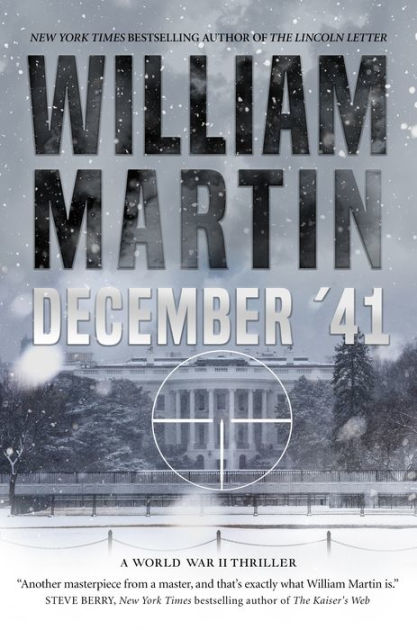Books I think you’ll enjoy (besides mine)…

Ghosts of Honolulu: A Japanese Spy, A Japanese-American Spy Hunter, and the Untold Story of Pearl Harbor, by Mark Harmon and Leon Carroll, Jr. – This book does a good job of explaining the dynamics of the Japanese-American population on Hawaii prior to and after the Pearl Harbor attack on December 7, 1941, especially how loyal Japanese-American citizens and actual Japanese spies co-existed on the island. The story focuses on how the Navy recruits one Japanese-American spy hunter to track Japanese spies — essentially the beginning of the Naval Intelligence Service, which eventually inspired the NCIS television series (Mark Harmon starred in the series and co-author Leon Carroll, a Marine and former NCIS special agent, is a technical advisor for the show). I did not find this book to be a total page-turner, but it was very interesting and offers a good perspective on the run-up to Pearl Harbor and the effort to hunt Japanese spies before and after the attack.
 A Higher Call: An Incredible True Story of Combat and Chivalry in the War-Torn Skies of World War II, by Adam Makos with Larry Alexander – This is a very special book – and IS a page-turner from start to finish. Here’s the problem: Even though it’s nonfiction, I can’t give too much away! Let me set it up this way: in December 1943, a badly damaged American bomber struggles to fly over wartime Germany. At the controls is 21-year-old Second Lieutenant Charlie Brown. Half his crew lay dead or wounded on this, their first mission. Suddenly, a German Messerschmitt fighter pulls up on the bomber’s tail. The pilot is German ace Franz Stigler – he has the bomber dead to rights and can destroy the young American crew with the squeeze of a trigger. As the book jacket says: “What happened next would defy imagination and later be called the most incredible encounter between enemies in World War II.” That’s all I can give you without spoiling things – trust me, clear your schedule and read this book!
A Higher Call: An Incredible True Story of Combat and Chivalry in the War-Torn Skies of World War II, by Adam Makos with Larry Alexander – This is a very special book – and IS a page-turner from start to finish. Here’s the problem: Even though it’s nonfiction, I can’t give too much away! Let me set it up this way: in December 1943, a badly damaged American bomber struggles to fly over wartime Germany. At the controls is 21-year-old Second Lieutenant Charlie Brown. Half his crew lay dead or wounded on this, their first mission. Suddenly, a German Messerschmitt fighter pulls up on the bomber’s tail. The pilot is German ace Franz Stigler – he has the bomber dead to rights and can destroy the young American crew with the squeeze of a trigger. As the book jacket says: “What happened next would defy imagination and later be called the most incredible encounter between enemies in World War II.” That’s all I can give you without spoiling things – trust me, clear your schedule and read this book!
The Blood of Others (fiction special), b y Graham Hurley – A spy thriller set during WWII amidst the Allied raid on Dieppe, France in August of 1942. At the heart of the story: Canadian journalist George Hogan; Annie Wrenne, who works at Lord Mountbatten’s cloak-and-dagger Combined Operations headquarters; and Abwehr intelligence officer William Schultz. These three characters are linked by Operation Jubilee, the Dieppe raid, when more than 6,000 men stormed heavily defended French beaches nearly two years before D-Day. You’ll really enjoy it!
y Graham Hurley – A spy thriller set during WWII amidst the Allied raid on Dieppe, France in August of 1942. At the heart of the story: Canadian journalist George Hogan; Annie Wrenne, who works at Lord Mountbatten’s cloak-and-dagger Combined Operations headquarters; and Abwehr intelligence officer William Schultz. These three characters are linked by Operation Jubilee, the Dieppe raid, when more than 6,000 men stormed heavily defended French beaches nearly two years before D-Day. You’ll really enjoy it!
 Longstreet: The Confederate General Who Defied the South, by Elizabeth R. Varon – I made notes throughout this excellent book, which focuses on Confederate General James Longstreet’s course change after the Civil War. Longstreet was always considered “Confederate # 3” behind Jefferson Davis and Robert E. Lee. He fought tenaciously for the Confederacy, including side-by-side with Lee at Gettysburg. After the war, though, Longstreet moves to Louisiana and makes one of the most remarkable about-faces in American history. He supported black voting, led the interracial state militia, embraced Reconstruction, and became an outcast in the South. Many white southerners subsequently blamed him retroactively for the South’s defeat in the Civil War. Varon recounts this amazing story in a strong narrative way, including Longstreet’s ongoing battle to save his reputation amidst withering criticism — particularly with a narrative that he undermined Lee at Gettysburg.
Longstreet: The Confederate General Who Defied the South, by Elizabeth R. Varon – I made notes throughout this excellent book, which focuses on Confederate General James Longstreet’s course change after the Civil War. Longstreet was always considered “Confederate # 3” behind Jefferson Davis and Robert E. Lee. He fought tenaciously for the Confederacy, including side-by-side with Lee at Gettysburg. After the war, though, Longstreet moves to Louisiana and makes one of the most remarkable about-faces in American history. He supported black voting, led the interracial state militia, embraced Reconstruction, and became an outcast in the South. Many white southerners subsequently blamed him retroactively for the South’s defeat in the Civil War. Varon recounts this amazing story in a strong narrative way, including Longstreet’s ongoing battle to save his reputation amidst withering criticism — particularly with a narrative that he undermined Lee at Gettysburg.
 The Forgers: The Forgotten Story of the Holocaust’s Most Audacious Rescue Operation, by Roger Moorhouse – Anytime I start to think I know all of the major story lines about the Second World War, along comes a compelling book to prove me wrong! The Forgers is one of those, dramatically (and for the first time) recounting the story of a group of Polish diplomats exiled in Sweden who, between 1940-1943, engaged in a wholly remarkable humanitarian operation. Working with Jewish activists, they mastermind a brilliant program of forging passports and other identity documents that were then smuggled into German-occupied Europe to save the lives of thousands of Jews facing extermination in the Holocaust. I knew nothing of this effort, perhaps not surprising because this is the first book on the topic. I hope you find this book as engrossing as I did!
The Forgers: The Forgotten Story of the Holocaust’s Most Audacious Rescue Operation, by Roger Moorhouse – Anytime I start to think I know all of the major story lines about the Second World War, along comes a compelling book to prove me wrong! The Forgers is one of those, dramatically (and for the first time) recounting the story of a group of Polish diplomats exiled in Sweden who, between 1940-1943, engaged in a wholly remarkable humanitarian operation. Working with Jewish activists, they mastermind a brilliant program of forging passports and other identity documents that were then smuggled into German-occupied Europe to save the lives of thousands of Jews facing extermination in the Holocaust. I knew nothing of this effort, perhaps not surprising because this is the first book on the topic. I hope you find this book as engrossing as I did!
 The Irish Assassins: Conspiracy, Revenge, and the Phoenix Park Murders That Stunned Victorian England, by Julie Kavanagh – Call this a story of “historical true crime” told in a gripping narrative, another compelling story in the long saga of Irish-English bitterness. Disrupting a tentative moment of hope between Ireland and Britain, the impact of the assassinations of British officials was cataclysmic – it destroyed a tentative peace pact, almost brought down the government, infuriated the Queen, shaped Irish politics for decades, and involved officials in Dublin, London, Paris, New York, and Cape Town, South Africa, among other locations. A long book, but fast-moving and definitely worth your time!
The Irish Assassins: Conspiracy, Revenge, and the Phoenix Park Murders That Stunned Victorian England, by Julie Kavanagh – Call this a story of “historical true crime” told in a gripping narrative, another compelling story in the long saga of Irish-English bitterness. Disrupting a tentative moment of hope between Ireland and Britain, the impact of the assassinations of British officials was cataclysmic – it destroyed a tentative peace pact, almost brought down the government, infuriated the Queen, shaped Irish politics for decades, and involved officials in Dublin, London, Paris, New York, and Cape Town, South Africa, among other locations. A long book, but fast-moving and definitely worth your time!
 (Fiction Special) Dead of Night, by Simon Scarrow – I loved this book! What happens when, one bitterly cold night in Berlin, an SS doctor is found dead in his study from an apparent self-inflicted gunshot wound? The official determination of the Reich is suicide – but the doctor’s wife doesn’t believe it, and at the risk of arrest from the Gestapo, neither does Criminal Inspector Horst Schenke. OK, that’s all I can say – except that the real-life history that is interwoven within the story narrative will shock you. Pick up this book as soon as you can, and clear your calendar for some reading time!!
(Fiction Special) Dead of Night, by Simon Scarrow – I loved this book! What happens when, one bitterly cold night in Berlin, an SS doctor is found dead in his study from an apparent self-inflicted gunshot wound? The official determination of the Reich is suicide – but the doctor’s wife doesn’t believe it, and at the risk of arrest from the Gestapo, neither does Criminal Inspector Horst Schenke. OK, that’s all I can say – except that the real-life history that is interwoven within the story narrative will shock you. Pick up this book as soon as you can, and clear your calendar for some reading time!!
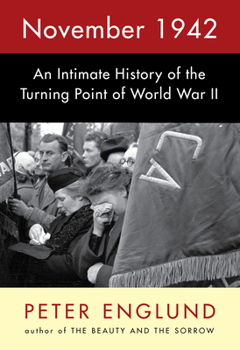 November 1942: An Intimate History of the Turning Point of WWII, by Peter Englund – I thoroughly enjoyed this book, and my copy has the margin mark-ups, the underlinings, and the post-it notes to prove it! Englund takes a unique perspective in telling the story of what he argues is the “turning point month” of WWII (and it’s hard to argue with him) — rather than tell a 50,000-foot-view story on the epic nature of the month (Guadalcanal, North Africa, Stalingrad, progress on the atomic bomb, etc.), Englund focuses on individual people around the world and the experiences and hardships they faced. Consequently, there is no overarching narrative that stitches the whole story together — the reader experiences the story along with the shop keeper in Leningrad, the mother in Shanghai, the Jewish worker at Treblinka, the woman factory worker in Savannah, Georgia, and all the others. None has any idea of what is happening to the other as they simply try to stay alive in and make sense of their own worlds. Somehow it all works! Englund took a similar approach in his World War I “intimate portrayal,” called The Beauty and the Sorrow. You need to commit to this book (it’s long and meaty), but you’ll be glad you did!
November 1942: An Intimate History of the Turning Point of WWII, by Peter Englund – I thoroughly enjoyed this book, and my copy has the margin mark-ups, the underlinings, and the post-it notes to prove it! Englund takes a unique perspective in telling the story of what he argues is the “turning point month” of WWII (and it’s hard to argue with him) — rather than tell a 50,000-foot-view story on the epic nature of the month (Guadalcanal, North Africa, Stalingrad, progress on the atomic bomb, etc.), Englund focuses on individual people around the world and the experiences and hardships they faced. Consequently, there is no overarching narrative that stitches the whole story together — the reader experiences the story along with the shop keeper in Leningrad, the mother in Shanghai, the Jewish worker at Treblinka, the woman factory worker in Savannah, Georgia, and all the others. None has any idea of what is happening to the other as they simply try to stay alive in and make sense of their own worlds. Somehow it all works! Englund took a similar approach in his World War I “intimate portrayal,” called The Beauty and the Sorrow. You need to commit to this book (it’s long and meaty), but you’ll be glad you did!
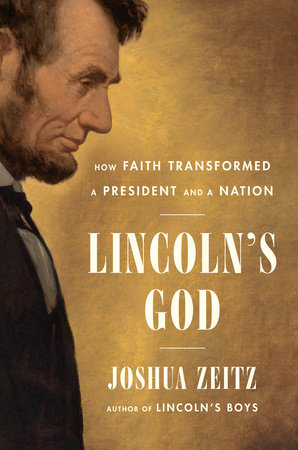 Lincoln’s God: How Faith Transformed a President and a Nation, by Joshua Zeitz – If you’re thinking to yourself, “What else can I possibly learn about Abraham Lincoln?” think again. I marked this book up throughout too and learned a great deal! The story arc traces Lincoln’s skepticism-to-near-evangelicalism about religion. First, he rejected his father’s strict Calvinist rules and became almost agnostic as a result, keeping organized religion at arm’s length and attending church only sporadically, even as a young man. But as he gets closer to and into the Presidency, and considers the issue of slavery, secession, and war, he evolves into a believer and harnesses religion to rally the nation — first to arms and then to abolish slavery (the war, he told Americans, was divine retribution for the sin of slavery). Lincoln made these religious themes the focus of his most important writing and speeches — the Emancipation Proclamation, the Gettysburg Address, and his memorable Second Inaugural.
Lincoln’s God: How Faith Transformed a President and a Nation, by Joshua Zeitz – If you’re thinking to yourself, “What else can I possibly learn about Abraham Lincoln?” think again. I marked this book up throughout too and learned a great deal! The story arc traces Lincoln’s skepticism-to-near-evangelicalism about religion. First, he rejected his father’s strict Calvinist rules and became almost agnostic as a result, keeping organized religion at arm’s length and attending church only sporadically, even as a young man. But as he gets closer to and into the Presidency, and considers the issue of slavery, secession, and war, he evolves into a believer and harnesses religion to rally the nation — first to arms and then to abolish slavery (the war, he told Americans, was divine retribution for the sin of slavery). Lincoln made these religious themes the focus of his most important writing and speeches — the Emancipation Proclamation, the Gettysburg Address, and his memorable Second Inaugural.
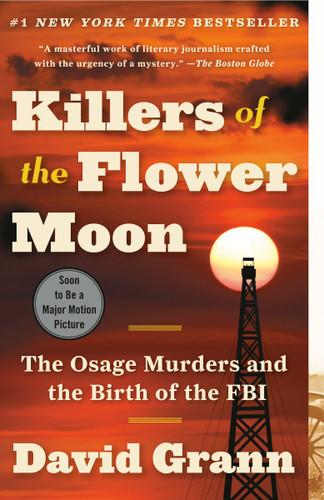 Killers of the Flower Moon: The Osage Murders and the Birth of the FBI, by David Grann – I’ll admit that I’m late in reading this book, and I’ll also confess that it was the release of the movie that finally drove me to read it. What a story! Grann combines the history of the era (1920s and 1930s) with one of the most chilling crime conspiracies in American history — the murder of wealthy members of the Osage Nation in Oklahoma (who became so after oil was discovered under their land). As the death toll rises, the FBI steps in and its young director, J. Edgard Hoover, turns to a former Texas Ranger to infiltrate the conspirators and solve their crimes.
Killers of the Flower Moon: The Osage Murders and the Birth of the FBI, by David Grann – I’ll admit that I’m late in reading this book, and I’ll also confess that it was the release of the movie that finally drove me to read it. What a story! Grann combines the history of the era (1920s and 1930s) with one of the most chilling crime conspiracies in American history — the murder of wealthy members of the Osage Nation in Oklahoma (who became so after oil was discovered under their land). As the death toll rises, the FBI steps in and its young director, J. Edgard Hoover, turns to a former Texas Ranger to infiltrate the conspirators and solve their crimes.
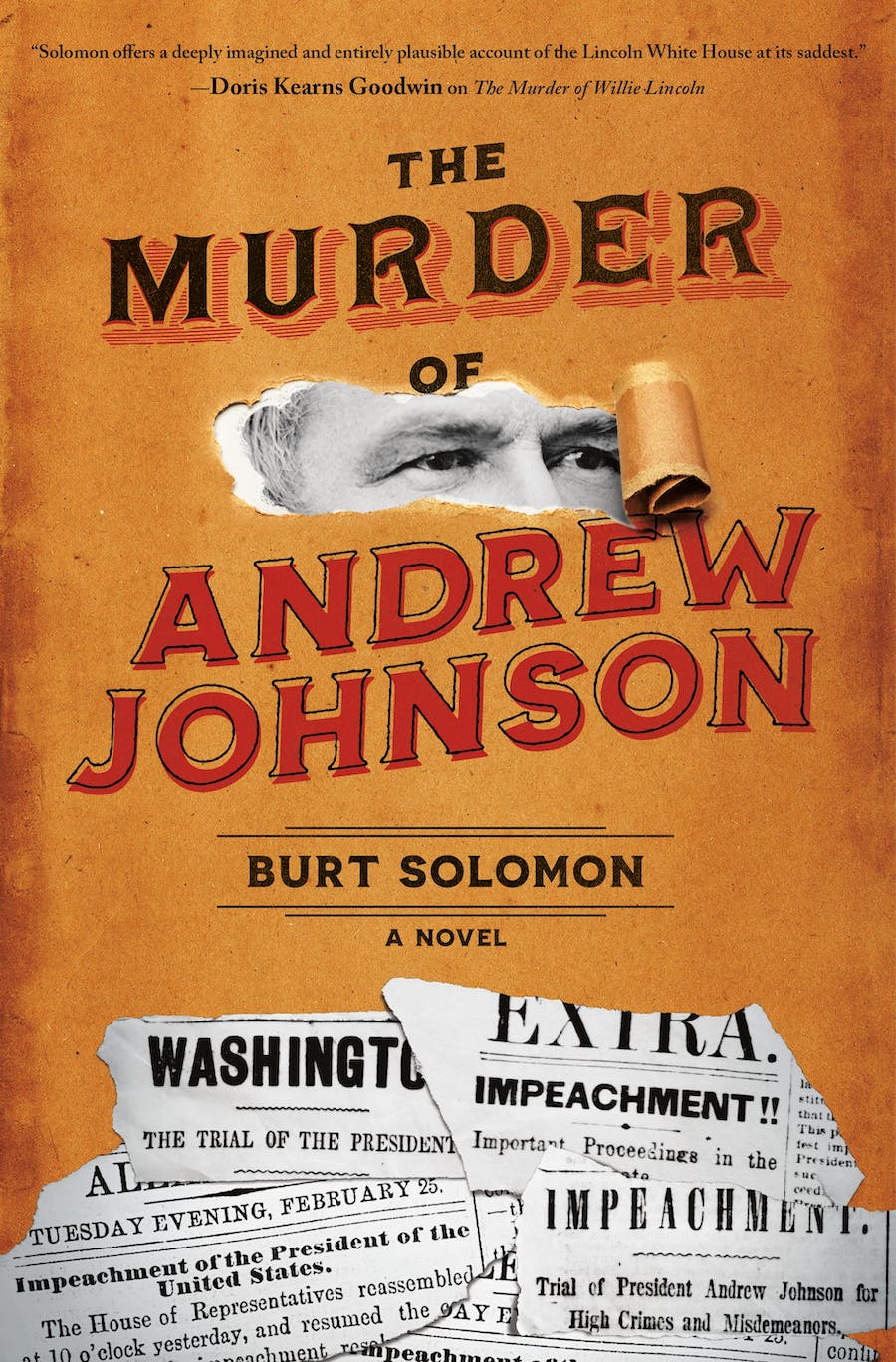
(Fiction Special) The Murder of Andrew Johnson, by Burt Solomon – I loved this book! But because it’s fiction, I can’t tell you too much about it for fear of giving too much away! Suffice to say that Solomon does a great job of spinning a mystery of President Andrew Johnson’s “murder” (in reality, he was not), a whodunit with a whole host of potential killers. Solomon took a similar approach in his book, The Murder of Willie Lincoln (who wasn’tmurdered either), and I thoroughly enjoyed that too. What I like about this author is the way he weaves a fictional mystery around absolutely accurate history and real-life characters. For example, the person intent on solving the crime is none other than “current” newspaperman John Hay, formerly one of Abraham Lincoln’s secretaries (the book takes place a decade after Lincoln’s assassination) — Hay, a real-life character working to solve a fictional crime. Great stuff! Enjoy!
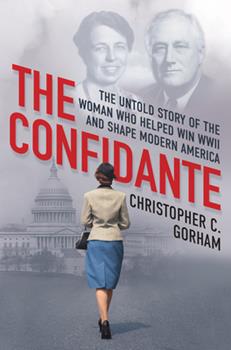 The Confidante: The Untold Story of the Woman Who Helped Win WWII and Shape Modern America, by Christopher Gorham — If you haven’t heard of Anna Rosenberg (and NO, she is not to be confused with convicted spies Julius and Ethel Rosenberg), then you are not alone. Until now, her powerful story hasn’t been told. She served as FDR’s special envoy to Europe in WWII, was instrumental in crafting policies that helped America win the war and prosper afterwards, and served as a high level diplomat and confidante in the Truman, Eisenhower, and Kennedy administrations. Chris Gorham tells a wonderful story and finally gives Anna her due! In the interest of full disclosure, I was proud to have reviewed Chris Gorham’s early proposal, and offer a blurb for this book (and thankful to Chris for his nice acknowledgment).
The Confidante: The Untold Story of the Woman Who Helped Win WWII and Shape Modern America, by Christopher Gorham — If you haven’t heard of Anna Rosenberg (and NO, she is not to be confused with convicted spies Julius and Ethel Rosenberg), then you are not alone. Until now, her powerful story hasn’t been told. She served as FDR’s special envoy to Europe in WWII, was instrumental in crafting policies that helped America win the war and prosper afterwards, and served as a high level diplomat and confidante in the Truman, Eisenhower, and Kennedy administrations. Chris Gorham tells a wonderful story and finally gives Anna her due! In the interest of full disclosure, I was proud to have reviewed Chris Gorham’s early proposal, and offer a blurb for this book (and thankful to Chris for his nice acknowledgment).
December ’41, by William Martin – This is a bonus historical fiction pick! It’s shortly after Pearl Harbor, and a German agent is planning to kill U.S. President Franklin D. Roosevelt on the night he lights the National Christmas tree in Washington D.C. The clock is ticking, the thrills and twists are fantastic, and…well, it’s fiction — so I can’t give too much else away. Bill Martin is at his best in this book — his research is impeccable and his narrative is relentless. Read this if you (or anyone you know) enjoys World War II and/or a great spy thriller.
 Ever to Excel: A History of Boston College, by James M. O’Toole — Time was, if you lived in the Boston area, you either attended Boston College or knew someone who had. Now, that same maxim can be used anywhere in the country — and huge parts of the world. BC has transformed itself from a small commuter school for Irish immigrants, established in the 1860s, to an international powerhouse regarded as one of the best universities anywhere. Jim O’Toole, University Historian at BC and the Clough Millennium Professor of History Emeritus, has written THE history of Boston College that anyone will enjoy. The best way to order this book for you or your “Eagle” of choice is to visit this website. And another full disclosure from me: in addition to being an amazing scholar and a fine writer, Jim is a good friend, and many years ago was one of the reviewers of my UMass- Boston master’s thesis (see item above).
Ever to Excel: A History of Boston College, by James M. O’Toole — Time was, if you lived in the Boston area, you either attended Boston College or knew someone who had. Now, that same maxim can be used anywhere in the country — and huge parts of the world. BC has transformed itself from a small commuter school for Irish immigrants, established in the 1860s, to an international powerhouse regarded as one of the best universities anywhere. Jim O’Toole, University Historian at BC and the Clough Millennium Professor of History Emeritus, has written THE history of Boston College that anyone will enjoy. The best way to order this book for you or your “Eagle” of choice is to visit this website. And another full disclosure from me: in addition to being an amazing scholar and a fine writer, Jim is a good friend, and many years ago was one of the reviewers of my UMass- Boston master’s thesis (see item above).
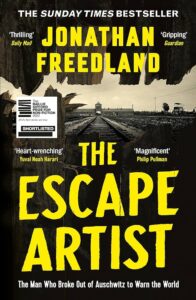
The Escape Artist: The Man Who Broke Out of Auschwitz to Warn the World, by Jonathan Freedland – This was a riveting book. In April 1944, Rudolf Vrba became one of the very first Jews to escape from Auschwitz and make his way to freedom. He and his fellow escapee, Fred Wetzler, were among a tiny handful of Jews who ever escaped the notorious Nazi death camp. Rudy and Fred smuggle out the first full account of Auschwitz that the world had ever seen, a detailed report that eventually reached President Franklin Roosevelt, British Prime Minister Winston Churchill, and even the Pope. Yet too few heeded the warning. Though Vrba helped save more than 200,000 Jews with his warning, he believed it could have been so many more. Very hard to put this one down — I consider it a must-read.
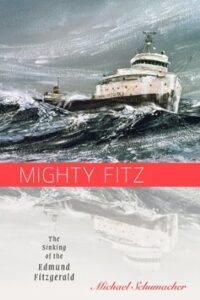 The Mighty Fitz: The Sinking of the Edmund Fitzgerald, by Michael Schumacher – I’m going to admit that I’m not a fan of the Gordon Lightfoot song, but the STORY of the sinking of the Edmund Fitzgerald on November 10, 1975 is jam-packed with drama and mystery. To this day, no one is 100 percent sure why the colossal ore carrier plunged to the bottom of Lake Superior in what seems to be mere minutes. Yes, the ship was in the middle of a pounding November storm — complete with gale force winds and 30-foot seas when its radar went out — but it had survived worse. The last words from the “Mighty Fitz’s” captain were: “We are holding our own.” The Fitz sank without a call for help. This book has great history, many personal stories, and in some ways reads like an unsolved mystery — for me it was made all the more poignant because our road trip (summarized above) took us to Whitefish Point, Michigan, and the Shipwreck Museum. The Edmund Fitzgerald was desperately trying to reach Whitefish Point and safe harbor when she went down.
The Mighty Fitz: The Sinking of the Edmund Fitzgerald, by Michael Schumacher – I’m going to admit that I’m not a fan of the Gordon Lightfoot song, but the STORY of the sinking of the Edmund Fitzgerald on November 10, 1975 is jam-packed with drama and mystery. To this day, no one is 100 percent sure why the colossal ore carrier plunged to the bottom of Lake Superior in what seems to be mere minutes. Yes, the ship was in the middle of a pounding November storm — complete with gale force winds and 30-foot seas when its radar went out — but it had survived worse. The last words from the “Mighty Fitz’s” captain were: “We are holding our own.” The Fitz sank without a call for help. This book has great history, many personal stories, and in some ways reads like an unsolved mystery — for me it was made all the more poignant because our road trip (summarized above) took us to Whitefish Point, Michigan, and the Shipwreck Museum. The Edmund Fitzgerald was desperately trying to reach Whitefish Point and safe harbor when she went down.

